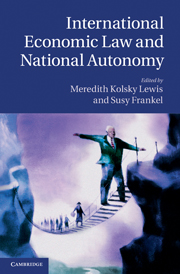Book contents
- Frontmatter
- Contents
- Notes on contributors
- Acknowledgements
- Introduction
- PART I International economic law: conceptions of convergence and divergence
- PART II WTO treaty interpretation: implications and consequences
- 4 Demanding perfection: private food standards and the SPS Agreement
- 5 Eroding national autonomy from the TRIPS Agreement
- 6 The WTO and RTAs: a ‘bottom-up’ interpretation of RTAs' autonomy over WTO law
- 7 ‘Gambling’ with sovereignty: complying with international obligations or upholding national autonomy
- PART III Responding to international economic law commitments
- PART IV Transformations in international economic law
- Index
- References
5 - Eroding national autonomy from the TRIPS Agreement
from PART II - WTO treaty interpretation: implications and consequences
Published online by Cambridge University Press: 10 January 2011
- Frontmatter
- Contents
- Notes on contributors
- Acknowledgements
- Introduction
- PART I International economic law: conceptions of convergence and divergence
- PART II WTO treaty interpretation: implications and consequences
- 4 Demanding perfection: private food standards and the SPS Agreement
- 5 Eroding national autonomy from the TRIPS Agreement
- 6 The WTO and RTAs: a ‘bottom-up’ interpretation of RTAs' autonomy over WTO law
- 7 ‘Gambling’ with sovereignty: complying with international obligations or upholding national autonomy
- PART III Responding to international economic law commitments
- PART IV Transformations in international economic law
- Index
- References
Summary
Introduction
The TRIPS Agreement has acquired a notorious reputation. Many regard its requirements as too onerous and out of step with the economic and development needs of developing countries. Some developed countries regard it as not strong enough in some areas, such as enforcement of intellectual property rights. Since the coming into force of the TRIPS Agreement its dissatisfied members, whether they are developed or developing countries, have negotiated, sometimes successfully, changes to international intellectual property protections in other international fora.
These changes have been possible for two reasons. First, because the changes are outside the scope of the TRIPS Agreement and so TRIPS is not a limitation on the protection emerging elsewhere. An example of this is the development of sui generis protection for traditional knowledge. Second, because the TRIPS Agreement provides members with degrees of national autonomy over the implementation of some aspects of the Agreement. This autonomy over implementation arises because of the structure of the TRIPS Agreement. The TRIPS Agreement has a framework that allows its members some national autonomy over their own intellectual property legal regime, as long as those laws do not otherwise breach the Agreement. That national autonomy, even if limited, is provided through a structural framework of minimum national standards of intellectual property protection which members are required to enact in their domestic law. Those standards are agreed minimums and members have also agreed that they may provide more extensive protection in their domestic laws.
- Type
- Chapter
- Information
- International Economic Law and National Autonomy , pp. 99 - 115Publisher: Cambridge University PressPrint publication year: 2010



